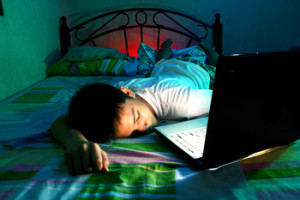@KPKiddoc Is Here To Tell Us How to Help Them Get It
From the first night home with a new baby until the morning they leave home for college, making sure our kids sleep enough is a challenge for any parent. First we rock them, later we cajole and bribe them to sleep. All that work is worth our while, especially when they are in middle and high school.
The National Sleep Foundation recommends kids ages 6 to 13 get 9 to 11 hours sleep a night. Teens need 8 to 10 hours. Our kids aren’t coming close. In a policy statement published by the American Academy of Pediatrics, the authors noted these troubling statistics on teen sleep habits:
- Six out of 10 middle-school kids and nearly nine out of 10 of high-school students get less than the recommended hours of sleep on school nights.
- High school seniors sleep on average less than seven hours a night.
- Lower- to middle-income students get even less sleep — six hours a night.
- In spite of these facts, seven of 10 parents believe their teens get enough sleep each night.

Lack of sleep puts our kids at risk. Chronic sleep deprivation increases their risk of obesity, diabetes and high cholesterol. They exercise less and eat worse. Kids who don’t get enough sleep are more likely to use cigarettes and alcohol and have sex. They more often feel aggressive, stressed, hopeless and contemplate suicide. They do not learn as well and perform poorly in school. They are far more likely to have a car crash if they sleep only six to seven hours a night.
There are many reasons our kids are sleep deprived. Two biological changes in particular cause a shift in the time teens fall asleep:
- Teens release melatonin (the hormone that helps induce sleep) later in the evening than younger children.
- Their circadian rhythms — the body’s internal clock — shifts with puberty. This causes onset of sleep to shift from 8 p.m. to 9 p.m. before puberty to 10 p.m. to -11 p.m. after.
These two biological changes cause a delay in natural sleep time. Putting these changes together, most teens can’t fall asleep much before 11 p.m. This means, in order to get the recommended amount of sleep, teens need to sleep until 8 a.m. So when teens need to be at high school by 7 a.m., it’s nearly impossible for them to get a good night’s sleep during the week.
Other causes of teen sleep deprivation include:
- Homework loads
- Sports, extracurricular activities and jobs
- Use of caffeine and energy drinks
- Overuse of electronics near bedtime
- Snoring or obstructive sleep apnea
- Emotional stress, worry, bullying
“The average adolescent in the United States is chronically sleep deprived and pathologically sleepy,” so how do we solve this problem? The American Academy of Pediatrics and the National Sleep Foundation recommend that middle and high schools across the country change school start time to 8:30 a.m. or later. Along with partnering with schools to make this change, there are other approaches parents can take:
- Set a firm bedtime with an environment that helps induce sleep: low lights, quiet
- Do not allow caffeine in the second half of the day
- Ensure 30 to 60 minutes of exercise a day
- Explore your teen’s stress level and emotional state; reach out for counseling help if needed
- Set a media curfew
And finally, it is important that parents are good role models. Teen sleep habits are closely linked to those of their parents. If you are (like half of parents of kids under 18) getting only about six hours of sleep a night, consider trying to get a bit more – for your health and that of your child.


